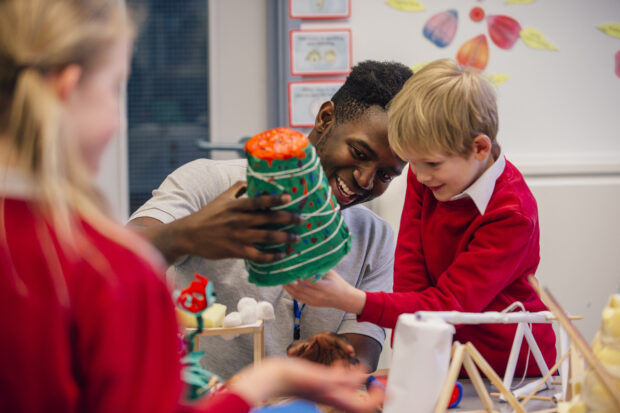
Starting in your first few months as a new teacher, can be a simultaneously exciting and daunting experience. Jason Beerjeraz, a primary school teacher at a school in Colchester and recent NQT, provides some first hand advice for how best to thrive in your first year as a teacher.
A challenging but rewarding career
Teaching – It’s not for the faint hearted, but it is one of the most rewarding careers you can ever have. I can safely say that no single day is the same, you will never find yourself watching the clock, nor will you ever fail to be amazed by the incredible things the pupils can come out with.
Like all professions teaching comes with its highs and lows. This is an advice piece, of sorts, drawn from experiences on the front line itself.

Settling into school life
A brilliant thing about schools is the fantastic mix of people you will find ready and willing to share wisdom gathered over the years - these are the teachers who have walked the path ahead.
Never be afraid to ask for help: there is no such thing as a ‘perfect teacher’ and we’ll always have something new to learn.
If you are given time to observe other teachers, grab this opportunity with both hands. Watch as much teaching as you can from as many different teachers as possible.
The aim of observing is not to judge what you see but to give you a reflective stance on your own practice, and to magpie some of those simple ideas you wish you had thought of! There is a lot to learn from others and this is a crucial element to developing your own practice.
Once you have navigated relationships with staff, next you’ll need to win over the parents.
Remember, you’re just a normal human – as are they, so no need for any school policy jargon at parents evening – just what they need to know about their child’s progress.
Parents simply want the best for their children, but the key is to listen carefully to their queries. We both know we have a common goal of wanting their child to reach their full potential, so you need to help them see you as an ally for this. Getting them on board can help you teach your students effectively not only in the classroom but at home too.
Work-life balance
I won’t sugar-coat it – a teacher’s workload can be daunting. However, you don’t have to sacrifice your social life, I promise! A lot of schools, including my own explore methods to help reduce workload.
If your school has a marking policy, follow it. Don’t try to adapt your own style for the sake of it. My advice would be to keep the marking simple and use face-to-face feedback to explain your reasons and help your pupil to improve for the next time.
My top tips would also be:
- Learn how to say no – in your first years aim to keep on top of your own work before accepting invites to do more marking or additional class projects can be a killer.
- Switch off – set yourself a strict cut off period for working. If you don’t you can end up losing your evening, weekend or even half-term break!
- Don’t let work invade your personal life – if you want to start a hobby, set aside time and do it. Go and see friends, read a book, do things for you and return to school feeling fresh.
Behaviour management
As you’d expect managing pupil behaviour is crucial for a well-functioning classroom. There can be a lot of different amazing characters in a classroom – especially at primary level. It’s so important to work with each of these characters, get to know their personalities and embrace them.
Building a rapport with your students is the most important part of being able to manage difficult behaviour. Respect is key when teaching students who show difficult behaviour, as is developing a positive relationship with them. This will equip you to manage their behaviour and help them learn.
Showing every pupil that you are there to support them is so important. Take time to get to know each as individuals: this works particularly well for those challenging students.
A saying that does the rounds with new teachers is the idea that a teacher is the weather in the classroom. This for me is 100% true – you can control the atmosphere and mood of a class through your body language, tone and the way you address things.
By praising the good and paying attention to the right behaviours you will help to cultivate a positive classroom environment.
Best of luck!
Like I said, teaching isn’t easy but nothing good ever is. The rewards from seeing students succeed and develop as young adults is priceless. There’s a sense of achievement and joy that cannot be replicated anywhere else.
Teaching gives you incredible access to the young minds of our future. Helping these young minds flourish is what you are there to do and I’m certain that the reward that comes with it will keep you going over the years to come.
Now go get going and good luck!